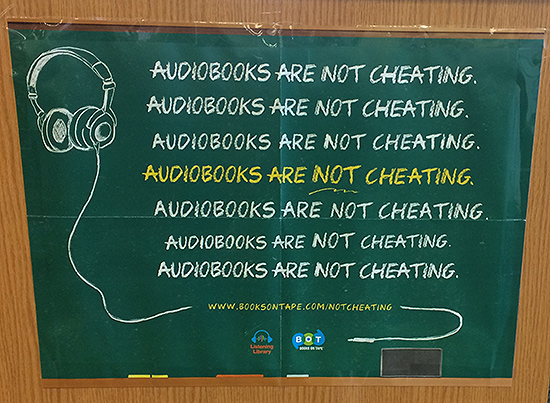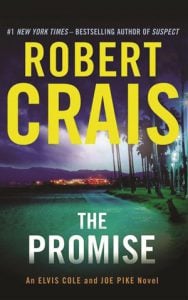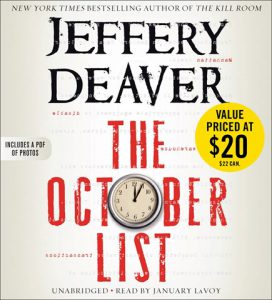Recently I took a trip to Central Virginia to visit a friend who moved there. She waited for me to arrive before heading out to her new library so she could sign up for a card and investigate this cherished repository of stories. It’s a lovely, modern building that includes a front porch and—no joke—rocking chairs. But what really caught my attention was this sign they had hanging on one of the bookshelves:

Having worked as a high school English teacher, I cannot understand the mindset that audiobooks are cheating. Don’t misunderstand—I believe literacy is vital in our society, but reading the words printed on the pages of a book is at the bottom of Bloom’s taxonomy. Where the true value of good stories comes into play is in the analysis, synthesis, and evaluation of characters, plot, theme, sometimes setting, symbols, etc. And when we listen to audiobooks, we’re still wholly responsible for that role.
I’ve heard Robert Crais say at book events that his stories aren’t complete until they’re in the hands of his readers. That isn’t because they’re going through the mechanics of reading the letters stamped on the paper—that’s simply the vehicle to be able to interact with the meaning he’s so carefully crafted. As a matter of fact, Crais tends to be vague when he describes his trademark characters of Elvis Cole and Joe Pike, yet anyone who’s read or listened to one of his books has a pretty detailed idea of what both men look like. Why? Because through their imaginations and personal experiences, they become actively involved in the story.
There’s plenty of research to support this as well—research that shows that once people master reading, comprehension is the same whether you’re reading or listening. A study in Finland indicated that listening to narrated stories stimulates parts of the brain associated with attention, memory, language, and mood.
Research or no, audiobook aficionados know a listener who processes a great narrator can find themselves having to pull over to the side of the road while driving because they can’t see through the tears of laughter—hello, George Guidall narrating Walt Longmire. Their hearts race in anticipation as they hope the conclusion comes soon because they need that vital organ to stay INSIDE their chests—Edoardo Ballerini gives Lincoln Rhyme the swiftness of a Olympic runner. Or the listeners find themselves so enveloped in historical, fictional, or far-off lands that they’d swear they were experiencing déjà vu if they ever found themselves in the actual place—oh, Mark Bramhall, how you can create atmosphere! And when called for, those talented performers can keep their listeners so off-kilter that the final plot twist catches them completely by surprise and sends their brain reeling—January LaVoy nails it with THE OCTOBER LIST.
I don’t get to enjoy this interplay with movies or television shows. I think that’s why books-to-film are often so disappointing for me. My vision of a person or a place rarely ever matches up with the director’s, and if I’ve already fallen in love with said character or setting, then a different vision simply fizzles. But even if it’s not a book I’ve read, I’m still not given the chance to process the author’s story and envision the people or the places. I can’t interpret the humor or sarcasm or depth; someone’s already done that for me. I’m only expected to watch passively.
There’s certainly room in the world for passive activities, but listening to audiobooks is not one of those. It isn’t cheating. Good audiobooks, like good print books, spark the brain and demand that their audience be a part of the story process. If they didn’t, our ancestors who only had oral transmission as a way to pass stories down probably just would have let those stories die.
Find more mystery audiobooks to love here!







